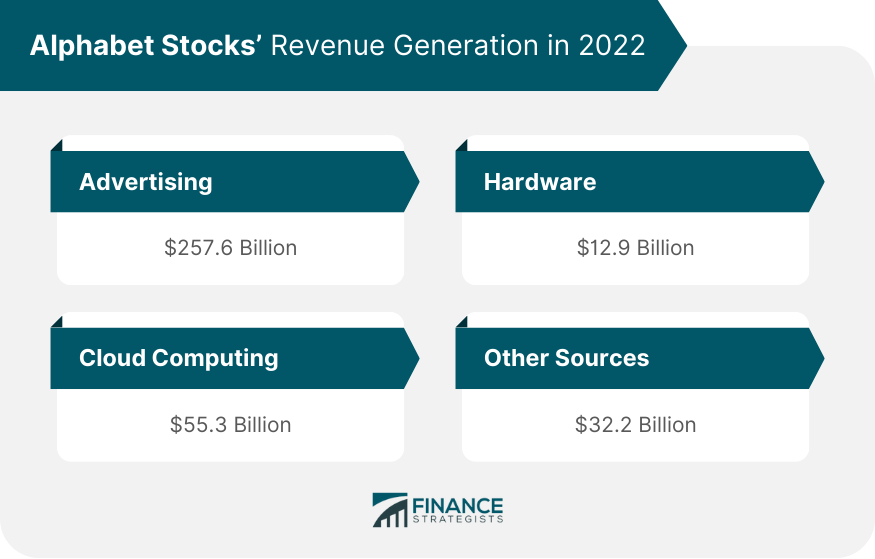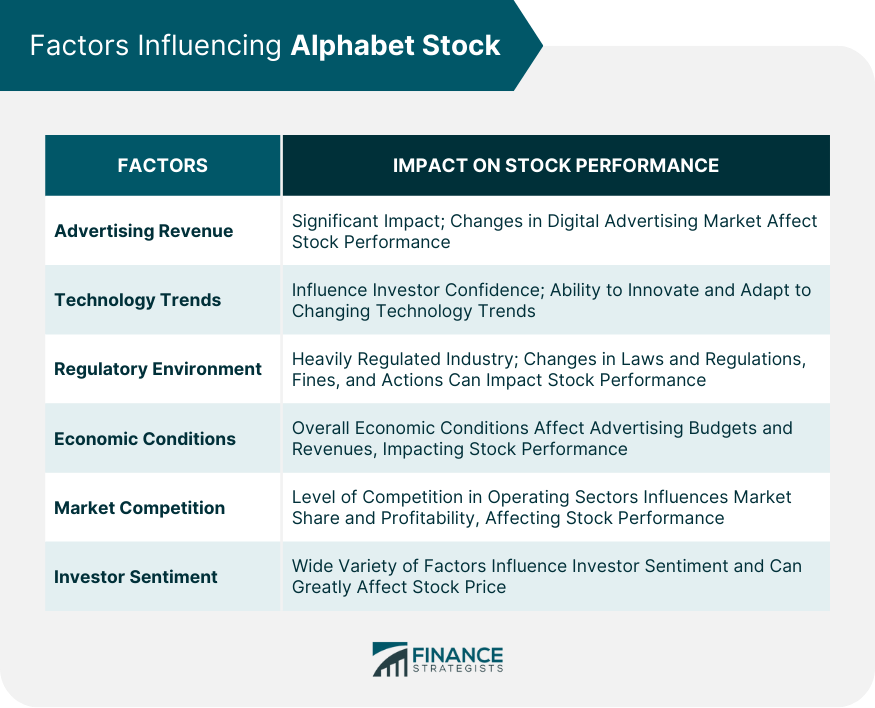Alphabet stock represents ownership in Alphabet Inc., the parent company of Google and several other businesses. Alphabet Inc. is a multinational conglomerate that was established in 2015 as part of a corporate restructuring of Google. The company's stock is publicly traded on the NASDAQ stock exchange under the ticker symbols GOOG (Class C shares) and GOOGL (Class A shares). Alphabet's business ventures include dominant platforms in technology, such as Google Search, YouTube, Android, and Google Cloud. In addition, Alphabet has other subsidiaries like Waymo in the self-driving car industry, Google Ventures and CapitalG in venture capital investments, and Verily in life sciences. Investors in Alphabet stock gain the potential for financial returns from Alphabet's broad business activities. However, the performance of the stock is subject to various market, industry, and company-specific factors. Therefore, potential investors should carefully analyze these aspects before investing. Founded by Larry Page and Sergey Brin, Alphabet Inc. stands as a testament to the evolution of the digital age. Originally launched as Google in 1998, it quickly rose to dominance due to its revolutionary search engine capabilities. In 2015, Google restructured its business and Alphabet Inc. was born. This move allowed more management scale, as all its businesses could operate more independently. Alphabet Inc. now stands as a collection of companies, the largest of which is Google. Other companies under the Alphabet umbrella include Calico, GV (formerly Google Ventures), CapitalG, Verily, Waymo, and X. These subsidiaries have allowed Alphabet to diversify and expand into industries such as self-driving cars, life sciences, and venture capital. Alphabet’s business model is a multi-sided platform. Its core business, Google, generates revenue primarily through advertising. Other businesses contribute to revenues through sales of products or services. For example, Google Cloud provides cloud computing services for businesses, and YouTube generates revenue through ads and premium subscription services. Google’s advertising revenue comes from two main sources: Google-owned sites (such as Google Search, YouTube, and Gmail) and Google Network Members’ websites. The company uses technology to connect businesses looking to advertise their products with consumers interested in those products. This ability to match advertisers with consumers across various platforms makes Alphabet's business model so successful. As one of the world's leading technology companies, Alphabet holds significant market share across various sectors. In search engine use, Google is virtually unrivaled, accounting for over 90% of global search engine market share. Its mobile operating system, Android, dominates the global smartphone OS market. Alphabet's presence in digital advertising is also substantial, with Google Ads and YouTube collectively accounting for a significant proportion of digital ad spending worldwide. Alphabet operates in a highly competitive market, populated by some of the most innovative companies globally. Key competitors include tech giants like Facebook, Amazon, Apple, and Microsoft, each battling for dominance in various overlapping areas such as cloud computing, digital advertising, artificial intelligence, and more. While Alphabet has a leading position in many of these areas, the competitive landscape is constantly evolving, requiring continual innovation to maintain and expand its market position. Several industry trends are currently impacting Alphabet's stock. The surge in digital transformation initiatives has boosted the demand for Alphabet's cloud services. Growing digital ad spending is another positive trend for Alphabet's primary revenue source. However, regulatory pressures present a potential challenge. Around the world, governments are scrutinizing the practices of tech giants, leading to potential regulatory changes that could impact Alphabet's business model. Alphabet's revenue is generated from a variety of sources, including: This is Alphabet's main source of revenue, accounting for over 80% of total revenue. Alphabet generates advertising revenue through its Google Ads platform, which allows businesses to display ads on Google's search engine and other properties. In fiscal year 2022, Alphabet's advertising revenue was $257.6 billion. Alphabet's cloud computing business, Google Cloud Platform, is a growing source of revenue. Google Cloud Platform provides a suite of cloud computing services, including computing, storage, networking, and machine learning. In fiscal year 2022, Alphabet's cloud computing revenue was $55.3 billion. Alphabet's hardware business includes products such as the Pixel phone, the Nest smart home products, and the Google Home smart speaker. In fiscal year 2022, Alphabet's hardware revenue was $12.9 billion. Alphabet's other sources of revenue include licensing fees, sales of digital content, and sales of hardware accessories. In fiscal year 2022, Alphabet's other revenue was $32.2 billion. Alphabet's profit margins have been consistently high over the past few years. In fiscal year 2022, Alphabet's operating margin was 30.4% and its net margin was 23.2%. These high profit margins are due to Alphabet's strong revenue growth and its efficient cost structure. Alphabet has a long history of paying dividends to its shareholders. In fiscal year 2022, Alphabet paid out $7.6 billion in dividends. Alphabet also repurchases its own stock on a regular basis. In fiscal year 2022, Alphabet repurchased $10.5 billion worth of its own stock. Overall, Alphabet's financial performance is very strong. The company has a diversified revenue stream, high profit margins, and a shareholder-friendly capital allocation policy. These factors make Alphabet a very attractive investment. Alphabet's financial performance is strong and has been improving over time. The company is well-positioned for continued growth in the future. Several factors can influence the performance of Alphabet's stock, including: As the primary source of Alphabet's income, any changes in the digital advertising market, such as shifts in advertiser budgets or changes in ad pricing, can have a significant impact on Alphabet's stock performance. Alphabet's ability to innovate and adapt to changing technology trends can influence investor confidence and, consequently, its stock price. This includes trends in artificial intelligence, cloud computing, machine learning, and other areas where Alphabet is actively involved. Alphabet operates in a heavily regulated environment, and changes in laws and regulations, especially those related to privacy and antitrust issues, can affect its stock performance. Regulatory fines or actions can have direct financial impacts, while changes in laws can potentially affect Alphabet's business model and operations. Like all companies, Alphabet is affected by overall economic conditions. In a strong economy, businesses are more likely to spend on advertising, potentially boosting Alphabet's revenues. Conversely, in a downturn, advertising budgets can be among the first areas to be cut, which could negatively impact Alphabet's revenues and stock price. The level of competition in Alphabet's various operating sectors can impact its market share and profitability, influencing the performance of its stock. Key competitors include other technology giants like Microsoft, Amazon, Facebook, and more. Lastly, investor sentiment, which can be influenced by a wide variety of factors including market trends, global events, and the company's own announcements, can greatly affect the stock's price. Alphabet Inc., the parent company of Google, is represented by Alphabet stock. The stock is traded on the NASDAQ stock exchange under the ticker symbols GOOG (Class C shares) and GOOGL (Class A shares). Alphabet's diverse business ventures include Google Search, YouTube, Android, Google Cloud, Waymo, Google Ventures, CapitalG, Verily, and more. Alphabet Inc. was established in 2015 through the restructuring of Google and has since evolved into a collection of companies operating under the Alphabet umbrella. Google, the largest subsidiary, generates revenue primarily through advertising. Other subsidiaries contribute to revenue through product sales and services. Alphabet's dominance is evident in its substantial market shares, such as over 90% in global search engine use and a significant portion of digital ad spending worldwide. Alphabet faces competition from major tech companies like Facebook, Amazon, Apple, and Microsoft, necessitating ongoing innovation to maintain and expand its market position. Alphabet's financial performance has been strong, with diverse revenue sources, high profit margins, and a shareholder-friendly capital allocation policy. What Is Alphabet Stock?
History of Alphabet Inc.
Alphabet's Business Model
Alphabet's Position in the Market
Market Share
Competitive Landscape
Industry Trends Impacting the Stock
Alphabet's Financial Performance
Revenue Generation
Advertising
Cloud Computing
Hardware
Other Sources

Profit Margins
Dividends and Stock Buybacks
Factors Influencing Alphabet Stock
Advertising Revenue
Technology Trends and Innovation
Regulatory Environment
Economic Conditions
Market Competition
Investor Sentiment

Conclusion
Alphabet Stock FAQs
Alphabet stock refers to the publicly traded shares of Alphabet Inc., Google's parent company, and other subsidiaries.
To buy Alphabet stock, you can open an account with a brokerage firm or use an online trading platform, then search for the stock using its ticker symbol, "GOOGL" or "GOOG," and place an order to purchase the shares.
GOOGL and GOOG are two different classes of Alphabet stock. GOOGL represents Class A shares, which carry voting rights, while GOOG represents Class C shares, which do not have voting rights but typically trade at a slightly lower price.
Several factors can influence the price of Alphabet stock, including the company's financial performance, market conditions, investor sentiment, technological advancements, regulatory changes, and competition within the tech industry. It's important to conduct thorough research and stay updated on relevant news when considering investing in Alphabet stock.
The potential for Alphabet stock as an investment depends on individual circumstances and investment goals. It's important to conduct thorough research, analyze financial data, and consider market conditions before making any investment decisions.
True Tamplin is a published author, public speaker, CEO of UpDigital, and founder of Finance Strategists.
True is a Certified Educator in Personal Finance (CEPF®), author of The Handy Financial Ratios Guide, a member of the Society for Advancing Business Editing and Writing, contributes to his financial education site, Finance Strategists, and has spoken to various financial communities such as the CFA Institute, as well as university students like his Alma mater, Biola University, where he received a bachelor of science in business and data analytics.
To learn more about True, visit his personal website or view his author profiles on Amazon, Nasdaq and Forbes.











